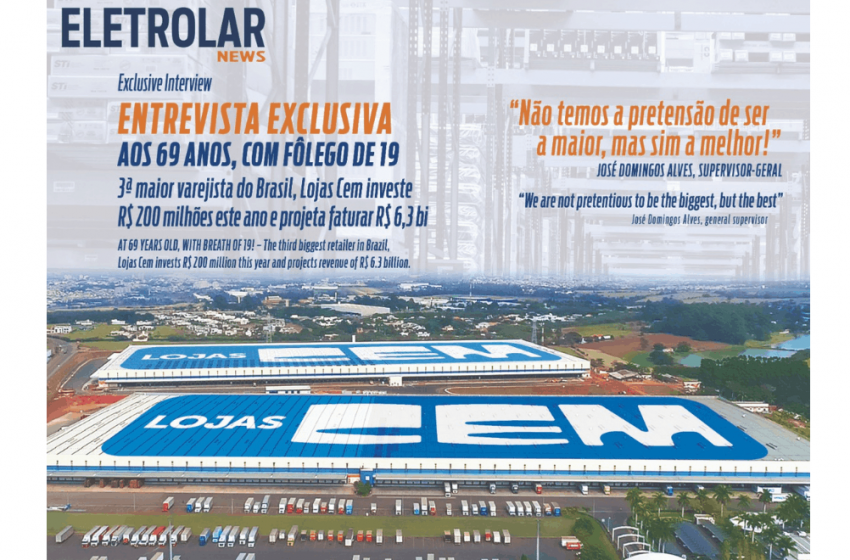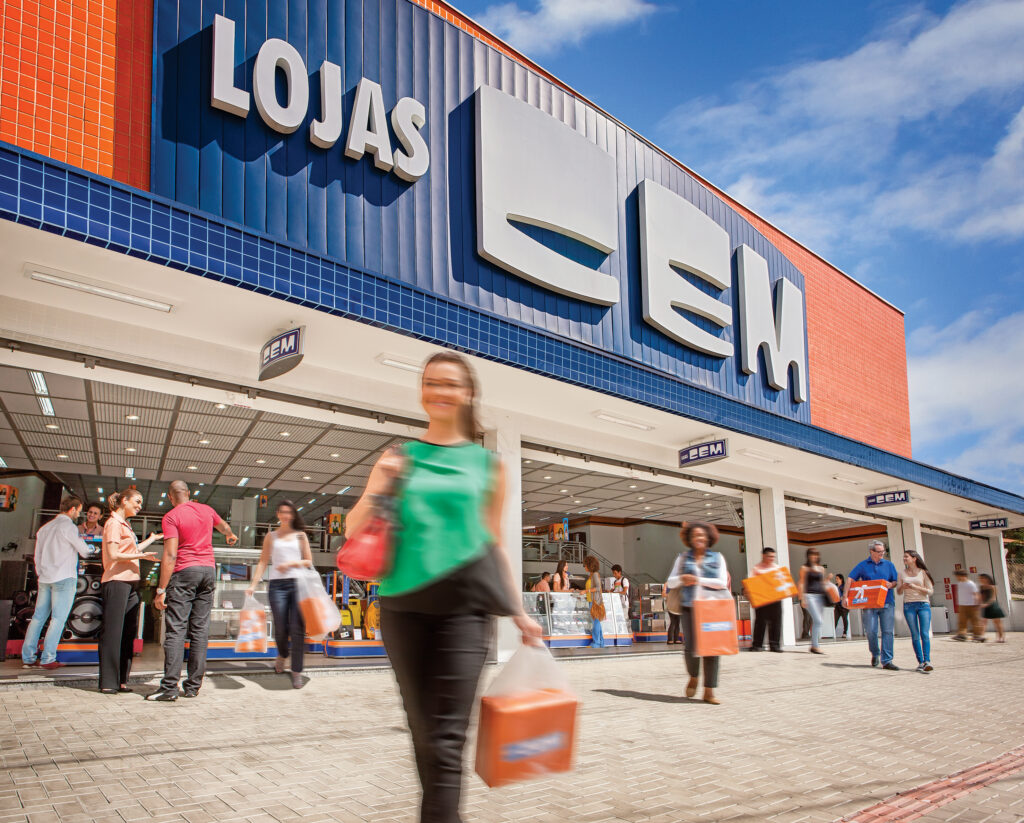
AT 69 YEARS OLD, WITH BREATH OF 19!
By Carlos Clur
The third biggest retail in Brazil, that started their story as a bicycle shop, has a peculiar way to act in the market. The verb to risk doesn’t belong to their company´s vocabulary. Every step is very well-structured. Capitalized, invests this year around R$200 million, a quarter of it in clean energy and the remaining to build 6 stores, that will add to the 288 already operating, and in the conclusion of the new distribution center, which will double their storage capacity. Their stores, each with 1.400 m² of space to showcase their products, and they are all located in their own properties. “The chain retails in a very simple and efficient manner, without pretension to be the biggest, but the best” affirms the general supervisor José Domingos Alves, in this exclusively interview for Eletrolar News.

“Yes, we will enter the electronics market, but we don’t have a set date yet. We plan to start with a well-structured and safe manner, keeping our customer service standards.”
How did a bicycle shop become the third biggest retailer in the country?
José Domingos Alves – In 1952, Remígio Dalla Vecchia opened a shop to fix and sell bicycles, parts and accessories in Salto, a city located 100 km from the state capital of São Paulo. It went on as a bike shop until 1956, when his sons realized there was a market opportunity to introduce electro-electronics into the business. At the time the company was small and didn´t have financial resources. They took credit from people who had money at home; they would pay back with 1% interest a month, much more than savings at the time. In 1966, when it entered the furniture business, it needed a bigger space. Consequently, it paid back all its creditors, changed address, and soon after, moved to their own building. It was then, that the story of a loyal and grateful company started in the city of Salto, its headquarter. The abbreviation CEM – Centro de Eletrodomésticos e Móveis (furniture and electro appliances center) was selected in 1976 through a local contest.

Since then, how has the company been growing?
JJDA – Our annual average is around 8% to 10%. Although the country has been through complex situations, in the last decade we grew more than 10% year-over-year. We also must highlight that we never stopped investing, not even during the pandemic. Today, we have more than 11.000 employees.
“We are investing in photovoltaic energy, and we already have 140 stores operating under it. Until the middle of next year, all our branches will have clean and renewable power.”
What will be the investment this year?
JDA – We are investing around R$ 200 million in the construction of six new stores, which will add up to 288 branches – and could reach 300 until the end of the year if the country’s bureaucracy doesn’t get in the way. All in buildings we own, standardized, to display 4.000 items, including mobiles, electronics, furniture, bicycles, home appliances and other products from durable goods segment. We are also concluding the work on our new distribution center in Salto (SP).
Is it advantageous to invest in your own buildings?
JDA – It is good business because we have capital. The group has 3 companies: Lojas Cem S/A, Cem Administração e Participações S/A, our chain properties owner, and PubliCem Publicidade, accountable for communications. Our stores pay rent to Cem Administração, as if they were tenants. Even if specialists say it is not wise to immobilize capital, imagine if we had to renegotiate rent in all properties during the pandemic while stores were closed for 70 days if we didn’t own our buildings. With our own properties, growth might be slow, but it is sustainable.

In what states are the branches located?
JDA – We have 224 stores in the state of São Paulo, 22 in Rio de Janeiro, 24 in Minas Gerais and 18 in Paraná, all within a radius of 650 km from the distribution and administrative center in Salto. This year, we opened stores in Rio Grande da Serra, Biritiba Mirim, a second one in Indaiatuba, the first one in Campinas (SP) and in Mangaratiba (RJ). Current in construction are the Miguel Pereira (RJ), Assis, and the second store in Limeira, a second one in Campinas, Mariporã, a second built in Atibaia – all in the state of São Paulo. We also purchase land to open our first store in Parati (RJ) and a second store in Taubaté and Ribeirão Preto (SP).
How much additional storage will the new DC provide?
JDA – The storage area will be increased from 116.600 m² to 233.200 m². Located next to our first distribution center that was built 19 years ago, this will be more high-tech. Within the same physical space, we will put a larger number of products as it has higher ceilings. Consequently, we will be able to buy larger quantities and will negotiate better with suppliers. The space permits to store products for 600 stores; it will help us grow. We doubled our storage capacity and will care for sustainability.
“The network’s storage area will be increased from 116,600 m² to 233,200 m² with the new distribution center. The space will allow us to store products for 600 stores. We will be able to buy larger quantities and do better business with suppliers.”
How?
JDA – We have at the new distribution center the biggest solar energy plant in a suspended area in the country. We are investing in photovoltaic energy, and we already have 140 stores operating under it. Until the middle of next year, all our branches will have clean and renewable power. I don’t know of any other chain that invested R$ 50 million for this purpose. Acting in a sustainable manner, we also save, because with photovoltaic energy, a light bill for instance, decreases 2.5% from its original amount. In five years, we will recover our investment. Whatever energy is left we can give away to distribution companies.

Is the company within the ESG standards?
JDA – In all aspects, corporate, ethical, social, and environmental. We don´t acquire furniture if we don’t know the wood source. The raw materials are fundamental to us. Each store we open, we generate from 30 to 40 new jobs. We never pay an invoice in registry office. ESG is fundamental to companies. Then, it should also be part of retail.
How is your supply chain? Do you have your own fleet?
JDA – At the beginning, we had our own fleet, but today we outsourced the service. The delivery becomes more rational, fast, and handled with care. We have trucks that unload products at receiving docks and from there, products proceed to the end customer in smaller vehicles. At the farthest cities, we deliver in 48 hours max.
What is the revenue expected for this year?
JDA – We expect to be R$ 6.3 billion. We booked 5.7 billion in 2020.
How much is the chain worth it? Are their plans to enter the Stock Exchange (B3)?
JDA – We are not interested to know its worth. It is a workers-company, not investors.
“Quem se expande nacionalmente encontra dificuldades. Nos últimos anos, mais de 40 concorrentes deixaram de existir, isso não é um bom sinal. Mercado que fecha empresas preocupa. Em 69 anos, nunca fechamos uma loja.”
Is it a unique way to operate?
JDA – We have our characteristics that may appear as if we are “outside the box,” but here it lays the secret of a fully capitalized company. We negotiate internally with the group, and we don’t pay rent to have our stores. We bank the entire operation and creditors. In case of past-due payments, our interest is 1% a month – you can compare that with what credit cards charge. During the pandemic we didn’t charge interest while our stores were closed, and even encourage our customer not to leave their homes to pay their installments.

Is the booklet a good deal? What is the representation in total sales?
JDA – It is a way to leverage sales. If all retailers had a way to finance their sales, they would work with this option. In our chain it represents 70% of all sales. The card (debit and credit) 14%. Other cash payments about 16%.
What is the category breakdown from the products sold?
JDA – We sell everything for the home. White line, mobile phones, portable electronics, and high-tech devices that make up 72% of our total sales. Furniture represents 28%. We assemble all products free of charge. Mobiles and big-screen TVs are the items more sought for at this moment.
What is your chain’s public?
JDA – We serve all public type. In the furniture line, predominately class B, C and D consumers.
How do you describe Lojas Cem?
JDA – It is a well-structured, of integrity, modern, and fully capitalized. We do what needs to be done, in the most simple and efficient manner. There is no right or wrong way to do retail. Our retail is done by people for people. We don’t have any aspiration to be the biggest, but to be the best. The board is directed by the three sons and the founder’s son-in-law.
What about e-commerce? When will it begin?
JDA – Yes, we will enter the electronics market, but we don’t have a set date yet. We plan to start with a well-structured and safe manner, keeping our customer service standards. We acquired the most recent SAP technology (a German company, one of the top 10 Fortune companies) used by 80% of the world’s GDP. We purchased the entire retail chain technology to better serve our needs. Today, if we close a deal until mid-afternoon, in 48 hours it will flow across all our stores, with the correct quantity allocated to each one of them. None of our competitors can do that.
Will you also act on the marketplace?
JDA – We will evaluate in due course.

How do you see the Brazilian retail?
JDA – Do retail in Brazil isn’t easy, there is a diversity of laws and regulations. One who expands nationally encounter difficulties. In the last years, more than 40 competitors ceased to exist; this is not a good sign. A market where stores closed is worrisome. In 69 years, we’ve never closed a store. Additionally, retailers should be concerned with sales, but never neglect the store. It must be clean, organized, and with fully trained employees. The moment a consumer enters a store should be magical; he is invited and welcomed.
Will the physical store undergo changes?
JDA – The physical store will be always changing. Technology has helped in that aspect, and it will even more. Physical stores appeal to people wanting in-person contact. The pandemic showed us that. However, it must have good customer service, with a professional staff armed with information, focus on on-time deliveries and post-sales support, besides a competitive price.
“The booklet is a way to leverage sales. If every retailer had a way to finance sales, it would work with this modality.”
Is building customer loyalty a challenge to retailers?
JDA – It has always been and will continue to be a challenge. You need to have a fair price, treat people well, respect the rights of those who sell and buy. Doing so, you have walked halfway. In 2014, we created the project “Going towards the wonderful world of Lojas Cem” to remind our partners that we have a clean and organized environment, and that our training is directed to fully prepare each one of them, which includes financial education, leadership, and care with health. In our network, we don’t hire anyone for a store manager role without experience. Everyone goes through a technical and psychological coaching and do internship at one of our stores. Doing so, we can carry-on our principles. It is a differential that we don’t want to lose. To prepare people isn’t easy, but it generates opportunities to all.
Does Loja Cem compete with the big retailers or with regional ones?
JDA – We are the third national revenue in the market of furniture, electronics, and home appliances retail sector. We intend to remain solid, always striving for the satisfaction of our greatest asset, our customer.

Source: Eletrolar News #144





